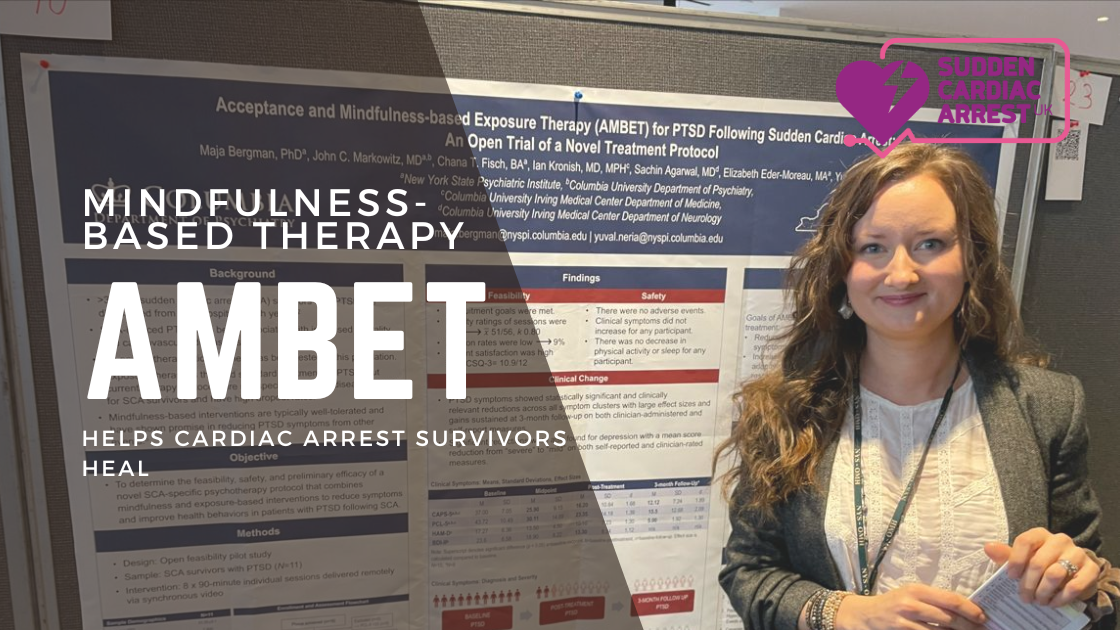Surviving a sudden cardiac arrest (SCA) is an incredibly traumatic experience. While the initial relief of being alive is undeniable, the aftermath can be a harrowing journey. For many SCA survivors, the road to recovery is paved with mental and emotional turmoil, often leading to the development of post-traumatic stress disorder (PTSD). This debilitating condition impair their ability to fully heal and embrace life once again.
A Survivor’s Perspective

Dr Maja Bergman, psychologist at the New York State Psychiatric Institute, understands the challenges of SCA survival on a profound level. She too has walked this path, having experienced a cardiac arrest herself. This unique perspective has driven her to pioneer a ground breaking therapy that offers hope to those grappling with the psychological aftermath of this life-altering event.
Introducing AMBET: A Tailored Approach

In a recent study in the Journal of Clinical Psychiatry, Dr Bergman and her team explored the efficacy of a novel treatment called Acceptance and Mindfulness-Based Exposure Therapy (AMBET) for PTSD following cardiac arrest. This innovative approach combines the principles of mindfulness practices with exposure therapy, a proven method for treating PTSD.
What sets AMBET apart is its cardiac-specific focus, addressing the unique challenges faced by SCA survivors. Dr Bergman’s team recognised that existing PTSD treatments might not be entirely suitable for this population, as they often lack the necessary adaptations for patients with limited explicit memories or ongoing cardiac threats.
A Glimpse into the Study
The open feasibility trial involved 11 SCA survivors meeting the criteria for PTSD. After eight 90-minute sessions of AMBET, the results were remarkable. Ten out of the 11 patients completed the treatment, with high satisfaction rates and no adverse events reported.
Statistically significant and clinically meaningful improvements in PTSD and mood symptoms were observed, with large effect sizes. At the end of the treatment, 80% of the completers showed clinically significant improvement, with 70% achieving PTSD remission.
Survivor Stories: Finding Solace in Mindfulness

The impact of AMBET is perhaps best understood through the experiences of SCA survivors themselves. Dave Cleland, a 57-year-old SCA survivor from the east coast of Suffolk, shared, “Psychologically, it just hangs with you. Suddenly, you find out how lucky you are to be one of the 8% of people who survive. It’s a shocking realisation.”
However, Dave found solace in mindfulness practices, stating, “I have done mindfulness for about five or six years now, and it’s definitely part of my routine at night. The biggest thing I also did was get encouraged to do some poetry – just sitting down for a while and shutting off from everything else but thinking about what you appreciate about your life is a bit more positive.”
Ruth, a 53-year-old SCA survivor from Somerset, echoed the challenges of adjusting to life after a cardiac arrest. “Part of surviving a cardiac arrest is getting your head around the fact that you’ve been clinically dead. You feel quite different; you don’t feel like yourself anymore.”
Dave and Ruth were featured on this week’s BBC Radio 4 programme “All in the Mind” where Dr Bergman’s work was discussed. Click below to go to the programme and the feature starts around the 12 minute mark.
If this is no longer available you can also hear the relevant excerpt on our YouTube channel.
The Way Forward: Expanding Hope

While the study’s sample size was small, the promising results warrant further research to establish AMBET’s efficacy and investigate potential moderators and mechanisms of action.
As Dr Bergman notes, “These encouraging pilot results warrant further research.” With a larger sample size and rigorous randomised design, AMBET could potentially become a game-changer in the treatment of PTSD for SCA survivors.
Conclusion
The journey of healing after a sudden cardiac arrest is a complex and multifaceted one, requiring a holistic approach that addresses both the physical and psychological aspects of recovery. Dr Bergman’s pioneering work with AMBET offers a glimmer of hope for SCA survivors, providing a tailored and effective way to navigate the psychological aftermath of this life-altering event.
As more research is conducted and the benefits of AMBET are further explored, it could pave the way for a broader implementation of mindfulness-based therapies in cardiac rehabilitation programs, ultimately improving the quality of life for survivors and their loved ones.
The road ahead may be long, but with the support of organizations like Sudden Cardiac Arrest UK and the dedication of researchers like Dr Bergman, SCA survivors can find the strength and resources to not only survive but thrive in the aftermath of their ordeal.

After our first meet-up in February 2015, I realised I was not alone. It was the first time since my cardiac arrest the previous year that I had spoken face-to-face with someone who had experienced what I had. This was also true for my wife, who also happened to be my lifesaver. From that meet-up, the idea of SCA UK was born. Since then, we have achieved a considerable amount, primarily providing information, resources and support to others in a similar situation but also raising the profile of survivorship and the need for better post-discharge care. We are starting to get traction in this, and with the formation of the charity, I genuinely believe we have a bright future ahead and will make a significant difference in the lives of many who join our ranks.


